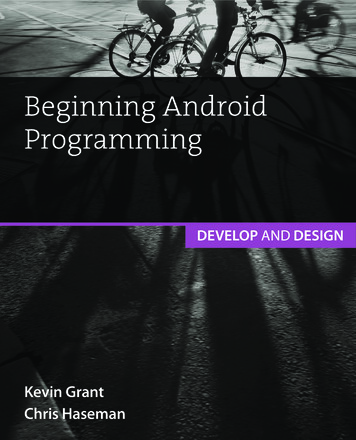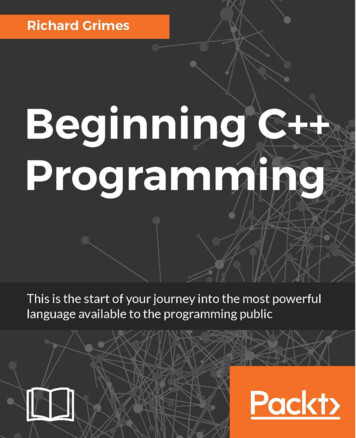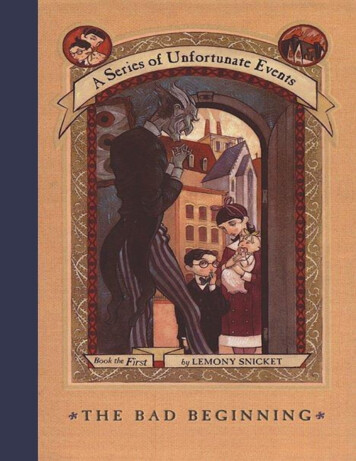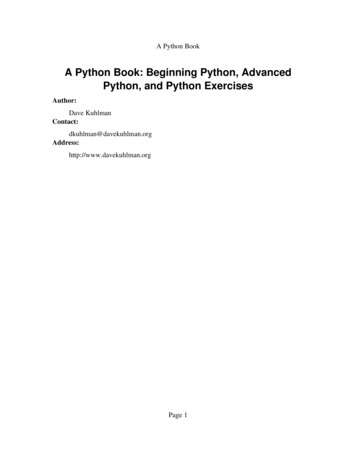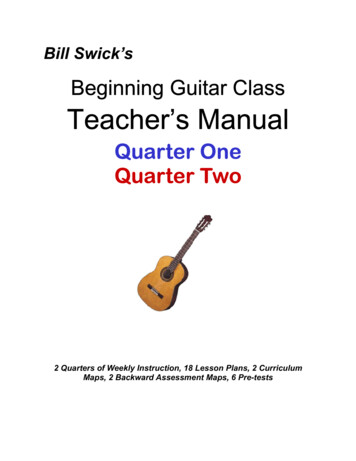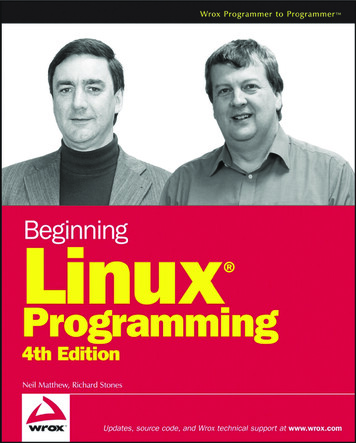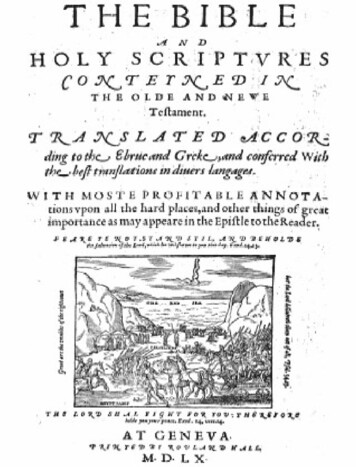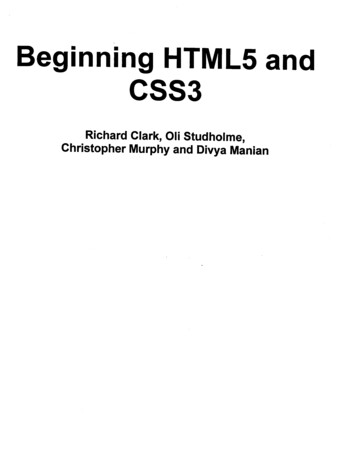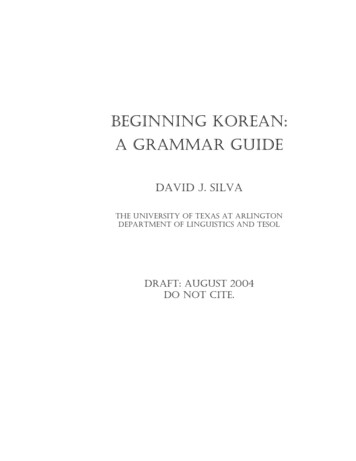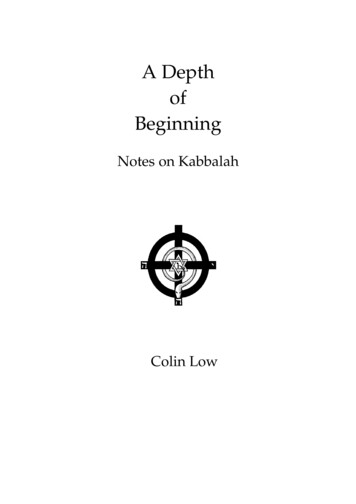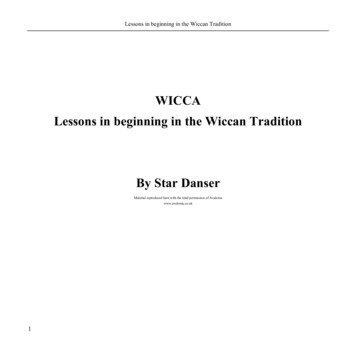
Transcription
Lessons in beginning in the Wiccan TraditionWICCALessons in beginning in the Wiccan TraditionBy Star DanserMaterial reproduced here with the kind permission of Avaloniawww.avalonia.co.uk1
Lessons in beginning in the Wiccan TraditionOriginally Published onWWW.AVALONIA.CO.UK2000As part of theGoddess Earth Mystery SocietyInitiative. Avalonia 2000, 2008This material in this booklet is copyright, but available for free non-commercial distribution.Please contact avalonia93@gmail.com for permissions,Or see the ‘Archives’ at www.avalonia.co.uk2
Lessons in beginning in the Wiccan TraditionLESSON 1“Wicca encompasses your whole worldview and way of life, and is always there in the way you look at andinteract with the world. Wicca is an experiential spiritual system of magick and ceremony that works withthe divine as both Goddess and God, and emphasises growth through balance and discipline. This balance,be it of light and dark, feminine and masculine, or active and passive, acts as a dynamic tension to createharmony and enable the individual to progress in their development through understanding theirrelationship with themselves and the world around them. The celebration of the Goddess and God is at theheart of Wicca. The patron Goddess of Wicca is usually associated with the Moon, although she is also oftenseen as having stellar, terrestrial and chthonian forms. The patron God of Wicca is usually associated withforests, plants and animals; he is also sometimes seen as having solar and chthonian forms.”[Extract from CIRCLE OF FIRE by Sorita D'Este & David Rankine]Wicca can also be described as a nature focused spirituality, which draws on the beliefs and practices of preChristian cultures, blended with ceremonial magick, witchcraft, Gnosticism, Thelema and Hermetics. The terms“Wicca” and “Witchcraft” are often used interchangeably, but it is important to note from the beginning of yourjourney that there are some differences. Keeping these differences in mind will help prevent misunderstandings andwill help you focus your learning and practice in a direction which suits you best, rather than wasting time andenergy arguing definitions! It is correct to say that all Wiccans are Witches, but important to keep in mind that notall Witches are Wiccans.Wicca was first made “public” by a man called Gerald Gardner back in the 1950’s and has since grown and evolved.There are many debates about where the practices originated from (if you want to learn more about the history ofWicca, we recommend you read “Triumph of the Moon” by Prof. Ronald Hutton) but although it is important tohave a firm grasp of the history of the tradition, it is also important to always keep in mind that as with all magickaltraditions, it is the experience and understanding which comes through practice which is the most important aspect.3
Lessons in beginning in the Wiccan TraditionFor many years Wicca was viewed as an initiatory tradition. That is, that in order to learn and experience thetradition fully, it was necessary to find a coven who are both willing and able to accept you as a trainee, work withthem, receive initiation and then continue working with them for a few years until such time that you decide youwish to start your own coven.In some respects not much has changed. It is still true that to fully understand and experience the tradition initiationinto the tradition and work with a coven will be of great help. However, now that so much has been written about thetradition (books and websites) it is possible to gain a good understanding of both the spirituality and practices ofWicca. It is even possible to experience some of the mystical aspects.Learning by yourself is however not an easy path, as you will need to read through dozens of books, spend a greatdeal of time and energy experimenting to find the methods which work best for you and learn to discriminatebetween the books which offer good information and those which have been written with a “fast buck” in mind. Thelatter often seems to be written by people with little understanding and experience of the tradition themselves.(Someone who learns the traditional way, by receiving initiation into a coven and then learning and practicing, willtypically take a minimum of 5 years to reach the point at which they are qualified to start teaching!)Ultimately, to be a “Wiccan” you need to have a both an understanding of the tradition, experience of the spiritualand practical aspects of the tradition, and firsthand experience of the mysticism inherent in the tradition. Wiccacombines magick and mysticism with spirituality. In addition you will also need to actually be practicing thetradition through celebration of the seasonal “Wheel of the Year” Sabbats, Moon Ceremonies (Esbats) and throughapplying the principles, ethics and spiritual life to your everyday life. It is not as easy as it sounds, nor does it suiteveryone!Wiccan ritual is not the same as every other tradition in the modern Pagan movement. It follows a set pattern, inwhich sacred space is created in the form of a magick circle, the Guardians of the Four Elemental Realms areinvoked, the Goddess and God are invoked, celebrations and magickal workings are performed, cakes and wine are4
Lessons in beginning in the Wiccan Traditionblessed and which ends when the circle is opened at the end. Many modern pagan traditions have taken their ideasfrom the Wiccan tradition and follow roughly the same structure, although they may apply different symbolism andideals to each stage.Witches may sometimes have the same spiritual beliefs as Wiccans, they may even share some of the same practices.However the term Witchcraft is applied in different ways in different cultures and can for this reason mean a varietyof things. Witchcraft is a term which can be used to describe magick which draws primarily on the energies of Earth,for this reason Witchcraft is sometimes referred to as “Low Magick” rather than the “High Magick” of Magickianswho more often draw energies from the stars and planets. Of course, yet again, there are overlap and Witches maysometimes also work with planetary and stellar energies, and Magickians may sometimes draw energy from theEarth. Witches tend to focus less on “ceremony” than Magickians, where as Wicca takes a bit from both worlds.Witches are not all spiritual, although all Witches will have a belief in a higher power of some type. Witches do notall believe in or venerate a Goddess or God. Witches may have Christian, Muslim, Hindu or any number of otherreligions (even if those religions object to witchcraft!), for this reason it is a good idea to clarify the term when youare using it, this can be done, for example, by saying you are a “Pagan Witch”. The term “Witch” is considered bymany to be a misappropriation of the term. It was used in the past to describe mythical haglike creatures who atebabies and could fly through the air, it was used to describe those who practiced negative magickal practices - orwho were perceived to do so. For the purposes of this website the term is used to mean someone who practicesModern Western Witchcraft, within the context of modern Neo-Paganism.So in summary: Wiccans follow a specific set of beliefs, and a specific way of performing ceremonies - althoughthere is flexibility, it is certainly not the same as everyone who practice witchcraft or magick. For this reason,Wiccans may all be Witches, but not all Witches are Wiccan, nor are all who practice Magick Witches or Wiccans!EXERCISE 15
Lessons in beginning in the Wiccan Traditiona. Spend some time in a place where you will not be disturbed. Think about your own beliefs in regards to deity(God / Goddess), Nature, Life, Death and what happens to the soul after Death. Make some notes in your notebook.At a later stage we will return to these notes and re-examine them.b. Write a short definition of the Wiccan tradition - based both on the information provided in Lesson 1 and otherbooks / websites you have read. Write a list of questions for yourself in regards to points which you are unclear onand return to them as you progress through the lessons to see if you are able to answer all of them by the end of thisshort course.6
Lessons in beginning in the Wiccan TraditionLESSON 2The Origins of WiccaThere are many debates about the origins of Wicca. Some say that Gerald Gardner “made it all up” whilst othersargue that Gerald Gardner was only passing on rituals and beliefs which he himself was taught in the “New ForestCoven”. The history of Wicca is a huge subject and if you are interested in finding out more we would recommendyou obtain copies of the following books for a rounded view: The Triumph of the Moon by Prof. Ronald Hutton Wiccan Roots by Philip Heselton Gerald Gardner and the Cauldron of Inspiration by Philip Heselton Wicca Magickal Beginnings by Sorita d’Este & David RankineHowever, although the history is an interesting and important part of our inheritance, it is not necessary to be ahistorian in order to start exploring the beliefs and practices of the Wiccan tradition.What is true is that regardless of where Wicca originated it has been largely practiced as an initiatory tradition forthe last 60 years. Key figures in its development in Great Britain include:7 Gerald Gardner Doreen Valiente Patricia Crowther Alex Sanders Maxine Sanders Stewart Farrar
Lessons in beginning in the Wiccan TraditionThere are of course many more and today many people continue to carry the torch for the tradition by makingavailable information, sharing ideas, teaching, facilitating covens and giving workshops / lectures on the Craft tothose who are interested.When examining key texts of the tradition - such as those presented to initiates in the Book of Shadows (some ofwhich has been published in “The Witches Bible” by Stewart and Janet Farrar) it is clear that the rituals (althoughnot all the beliefs) has been heavily influenced by three older traditions of magick: The Hermetic Order of the Golden Dawn (GD)# The Ordo Templi Orientis (OTO) The Grimoire Tradition (Key of Solomon, Goetia, Heptamaron)When examining the beliefs and spiritual components of the tradition it becomes clear that this has been influencedby: Ancient Greek and Roman Religion and Magick Celtic and British Folk Customs and Magick Egyptian Religion and Magick Hermetic, Alchemical and Qabalistic thoughtOf course there have been many other influences also and it has become increasingly popular and accepted thatindividual High Priestesses and High Priests adapt their rituals and other workings through experience, passing onboth the traditional and revised practices to their own initiates.8
Lessons in beginning in the Wiccan TraditionEXERCISE 2a) Spend some time thinking about what influenced you to find out more about the Wiccan tradition. Was itsomething you read, experienced or did a friend spark your interest? Make notes about this under the heading“Sparking my Path” (or something like that!) in your notebook. Again this is something that you will return to intime.9
Lessons in beginning in the Wiccan TraditionLESSON 3Initiation, Self Dedication & WiccaYou would already have heard the term “initiation” in lessons 1 & 2. But what exactly does it mean within thecontext of the Wiccan tradition and how is it applied in the tradition?Traditional “Gardnerian” and “Alexandrian” covens, as well as other derivatives which follow a Wiccan initiatorystructure will typically have three degrees. These are usually: First Degree - Initiation as a “Witch & Priestess”; “Witch & Priest” or “Witch”. Second Degree - Initiation/ Elevation as a “High Priestess”/”High Priest” or “Priestess” / “Priest” Third Degree - Initiation/Elevation as a “High Priestess & Witch Queen” or “High Priest & Magus”These titles are only used in regards to the tradition and only the REALLY pretentious and egotistical go aroundcalling themselves anything of the kind all the time!Some covens also have a stage before first degree which is called “probationer” or “neophyte” or “trainee” or“dedicant”. It is usual that a person starts their journey with a coven with a simple ceremony in which they pledge tostudy and walk the path towards initiation - this is done to both the Goddess and God, as well as to the coven theyare working with as a sign of their commitment. Typically a period of “a year and a day” is spent in this preinitiation stage of training, allowing time for the trainee to see whether or not Wicca is something they wish topursue further and also for both the trainee and coven members to get to know each other, so that they can be surethat they wish to continue working together. I like to describe the probationer stage as “dating before marriage” - forsome it is immediately apparent that is the right thing, where as other relationships may take longer - so although the“year and a day” is the norm, it is not unusual to find that some people may be initiated sooner where as for others itmay take several years before they are ready to take the step!10
Lessons in beginning in the Wiccan TraditionWhat is the purpose of initiation?Initiation is one of the ways in which mysticism is expressed in Wicca. Those who undertake first degree initiationaligns themselves with the tradition through the experience knowing that everyone else who is of the same traditionhas undergone the same experience too. Without the shared experience, alignment to the “current” (a term used todescribe the energy of the tradition) is difficult, although not completely impossible.Initiation is an entrance into the tradition and a commitment to it. It is also a commitment to the Gods and to oneself.Of course it is possible to make these pledges as a solitary, but they would take a different form - a process which isusually called “self-dedication” and at times incorrectly “self-initiation”.EXERCISE 3a) Consider the idea of initiation. Is this som
tradition (books and websites) it is possible to gain a good understanding of both the spirituality and practices of Wicca. It is even possible to experience some of the mystical aspects. Learning by yourself is however not an easy path, as you will need to read through dozens of books, spend a great deal of time and energy experimenting to find the methods which work best for you and learn to .

